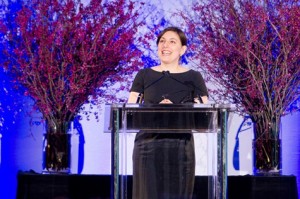The Isla Vista Shootings and Why We Need Humanist Heroines and Heroes
 Jessica Valenti, recipient of the 2014 Humanist Heroine Award
Jessica Valenti, recipient of the 2014 Humanist Heroine Award On June 7, 2014, Jessica Valenti received the Humanist Heroine Award at the American Humanist Association’s annual conference. Through her writing and filmmaking, Valenti has championed women’s equality, advocated for human rights and exposed the toxic nature of evangelical Christianity’s culture of sexual “purity.” Her work exemplifies feminist and humanist values, and she has revitalized issues of gender equity for a new generation.
Valenti’s many accomplishments have made her more than deserving of the Humanist Heroine Award. However, some individuals might express uncertainty about the ability of the feminist and humanist movements to work together. Some humanists feel that, because humanism promotes the rights of all human beings, there is no need for a movement that focuses specifically on women’s issues. Constructive criticism of feminism from the humanist movement (and vice versa) is certainly necessary for strengthening both causes, but Valenti’s speech at the awards luncheon focused on the reasons why a movement specifically for women is essential and should be supported by humanists. Through her discussion of the recent killings in Isla Vista, California, Valenti highlighted the ways in which women in the United States are still viewed not as fully human but as objects of sexual conquest and status for straight men.
Elliot Rodger, who killed seven people and wounded thirteen more in Isla Vista, was motivated by an ugly concoction of misogyny and racism, in which he viewed women and people of color as animals instead of human beings. In his written manifesto, Rodger reduced women to mere objects of men’s sexual desires. From his perspective, they were on par with fancy cars, designer watches and tailored suits. Women, to Rodger, were signs of a man’s wealth, prestige and masculinity; they were not fully human. Rodger also expressed disdain for his Asian heritage and saw men of color as weak and of lesser worth. While mental illness likely played a role in Rodger’s rampage, less violent forms of his prejudices can be seen in popular culture through ads that equates women’s bodies with products for sale and stereotypes that reduce men of color to sidekicks and punchlines. His chilling manifesto reflects and then magnifies bigotry that already exists within our society.
In a culture that still rejects the full humanity of certain groups, such as women and people of color, movements that focus specifically on problems of sexism and racism are crucial. Feminism’s specific perspective on women’s equality is necessary because women are all too often denied their humanity, meaning that they will experience discrimination, harassment and other barriers to equality that men will never need to face. Discussions of all human beings that neglect to include nuances of experience based on someone’s gender or race may, perhaps unintentionally, ignore intolerance unique to these particular groups. At the same time, in formulating concepts such as human rights, justice and equality, humanism helped lay the groundwork for feminism and other movements to affirm the humanity and inherent worth of women and people of color. In light of the atrocity that is the Isla Vista killings, humanists and feminists should realize how much work is still left to be done in our society in order to promote the shared values of compassion, equality and respect.
Jessica Valenti’s speech at the conference appealed to these shared values. She called for greater empathy toward women, so that they would be recognized as human beings, not just sex objects and status symbols. She also called for an end to gender-based double standards, often perpetuated by religious teachings, which insult men by claiming that they have no self-control and defining them only by their sexual desires. During the question and answer period after her speech, many men in the audience expressed their desire to better understand gender inequality so that they could be both better feminists and humanists.
Valenti’s talk demonstrated the powerful intersections that exist between the feminist movement and the humanist movement. In a progressive environment, where women’s voices are heard and their stories are respected, human rights for everyone are upheld. With the dark shadow of the Isla Vista shooting still looming over the nation, the need for both feminism and humanism has never seemed greater. Our society needs more humanist heroines (and heroes!) like Jessica Valenti who will advocate for feminism and the recognition of women’s full humanity and dignity. We also need a culture that espouses the humanist values of equality, reason and compassion. By working together, both movements might more effectively combat the gender inequality, racism and violence that were at the heart of the Isla Vista shooting. The combined energy of both the feminist and humanist movements could strengthen discussions about the continuing need for women’s equality in our society and amplify the call to bolster human rights for all.
